
Pakistan increased the price of petrol As Pakistan battles its worst economic turmoil – with inflation and unemployment rates touching record highs – the government has now announced a “minimum” increase in oil prices of Rs 35 per litre. As per the latest announcement, the price of petrol was increased by Rs 35, diesel and kerosene by Rs 18 each. The major development came a day after Dar said that Pakistan was the only country established in the name of Islam and “Allah is responsible for it.” its growth and prosperity”.
Addressing the nation in a video message, Finance Minister Ishaq Dar on Sunday morning said the increase in prices comes after almost four months and added that the government has decided to hike petrol by “minimum” Rs 35 per litre. With the latest announcement, petrol prices in Pakistan have gone up to Rs 249.80 per litre, high-speed diesel – Rs 262.80 per litre, kerosene – Rs 189.83 per liter and light diesel oil to Rs 187 per litre.
Finance Minister calls it ‘minimal increase’
During the address, Dawn, a Pakistani English daily, reported that the minister refuted so-called intelligence and media reports that estimated prices would be increased by a minimum of Rs 50 per litre. “Due to this, we have received reports of artificial shortage in the market. Pakistani Rupee witnessed devaluation last week […] And now we are seeing an 11 per cent increase in the prices of petroleum products in the international market.
“Despite international prices and rupee depreciation, we have decided to increase the minimum price of these four products on the instructions of Prime Minister Shehbaz Sharif,” he said.
No petrol in Pakistan!
Significantly, the country is facing the worst economic crisis ever. Earlier on Wednesday, several local media reports claimed that citizens were struggling hard to get fuel for their vehicles. According to a Dawn report, long queues were seen at several petrol pumps. People waiting in the queue while talking to the media said that the waiting time at the fueling stations was more than an hour.
According to reports, Pakistan’s capital Islamabad and Khyber Pakhtunkhwa province were the most affected cities as oil marketing companies reduced their imports. “I had to wait for almost half an hour to fill fuel at the GT Road petrol pump,” he was quoted as saying by Dawn newspaper. At least 20 more are standing there, he said.
The motorcyclist said he waited for about 50 minutes at a filling station in Fakirabad area. There is news of mass closure of petrol pumps in Mansehra district due to shortage of petrol. The Khyber Pakhtunkhwa CNG Administration on December 31 closed all CNG stations in the provincial capital for a month to ensure supply of natural gas to domestic consumers.
The News International reported this week that the gas crisis in Pakistan is set to worsen in February as ENI, a liquefied natural gas (LNG) trading company in Pakistan, has pulled back from an LNG cargo that was due to arrive on February 6-7. 2023, a senior energy ministry official confirmed.
Pakistan economic crisis
Significantly, the country is facing the worst economic crisis since three months of floods, which washed away almost all the major crops of the country. However, the situation was not “right” for Pakistan even before the natural disaster hit the country. According to several local media reports, even in the first week of August, edible oil sold at Rs 600 per liter and ghee at around Rs 700 per litre. The situation turned critical after deadly floods, in which more than 2,000 people died and thousands went missing. In December, local media reported that the price of cooking gas rose to Rs 1,200 per kg near the Afghan border areas, while the price of flour rose to Rs 160-170 per kg.
Also read: No petrol in Pakistan! Long queues at fuel stations amid economic turmoil: Report